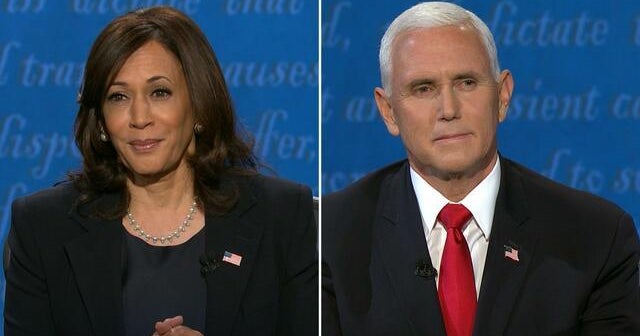Key Moments and Talking Points: Cbs Vice Presidential Debate

The CBS Vice Presidential Debate was a significant event in the 2024 election cycle, providing voters with a glimpse into the candidates’ policy positions and personalities. While the debate covered a range of issues, certain moments and talking points emerged as particularly noteworthy.
The debate featured a series of exchanges between the candidates on key issues, including the economy, healthcare, foreign policy, and climate change. These exchanges provided insights into their policy stances and how they might approach these challenges if elected.
Most Talked-About Moments
The following moments generated significant buzz and discussion on social media and in news coverage:
- The Economy: The candidates clashed on their economic policies, particularly regarding inflation and tax cuts. One candidate emphasized the need for fiscal responsibility and responsible spending, while the other advocated for increased government investment in infrastructure and social programs.
- Healthcare: The candidates debated the role of government in healthcare, with one arguing for a single-payer system and the other supporting a market-based approach. This exchange highlighted the stark differences in their views on the role of government in providing healthcare.
- Foreign Policy: The candidates discussed their approaches to foreign policy, including the ongoing war in Ukraine and the rise of China. One candidate emphasized a strong military presence and a willingness to confront adversaries, while the other advocated for diplomacy and international cooperation.
- Climate Change: The candidates debated the urgency of addressing climate change and the role of government in mitigating its effects. One candidate highlighted the need for ambitious action and investment in renewable energy, while the other expressed concerns about the economic impact of climate policies.
- Personal Attacks: The debate also saw some personal attacks, with each candidate criticizing the other’s record and character. These exchanges were met with mixed reactions, with some viewers finding them unproductive and others seeing them as a reflection of the current political climate.
Most Impactful Moments
Several moments in the debate had the potential to influence public opinion or shift the narrative of the election.
- The Economy: The debate provided a platform for the candidates to articulate their economic visions. One candidate’s focus on fiscal responsibility may have resonated with voters concerned about inflation, while the other candidate’s emphasis on government investment may have appealed to those seeking economic stimulus and social programs.
- Healthcare: The debate’s focus on healthcare could have a significant impact on the election, as healthcare is a top priority for many voters. The candidates’ differing views on the role of government in healthcare could influence voters who are undecided or seeking change.
- Foreign Policy: The debate’s discussion of foreign policy issues, particularly the war in Ukraine and the rise of China, could shape voters’ perceptions of the candidates’ ability to handle international crises. The candidates’ contrasting approaches to these issues could influence voters who are concerned about national security and international relations.
Impact and Analysis of the Debate

The Vice Presidential debate, a pivotal moment in the election cycle, generated significant buzz and sparked numerous discussions about its potential impact on the race. While the debate itself may not directly determine the outcome of the election, its influence on voter perception, undecided voters, and the broader political landscape cannot be overlooked.
Impact on Voter Turnout and Undecided Voters
The debate has the potential to energize voters on both sides of the political spectrum, leading to increased turnout. This is particularly true for voters who are already leaning towards a specific candidate but need an extra push to head to the polls. Additionally, the debate may sway undecided voters, especially those who are still grappling with the candidates’ positions on key issues. A strong performance can solidify support for a candidate, while a weak performance could lead to a loss of momentum.
Media Coverage and Public Reaction, Cbs vice presidential debate
The media’s coverage of the debate will play a crucial role in shaping public perception. News outlets, both traditional and online, will dissect the candidates’ performances, focusing on key moments, talking points, and the overall tone of the debate. Social media platforms will also be abuzz with reactions, with users sharing their opinions and interpretations of the event.
For example, in the 2020 Vice Presidential debate, the media coverage heavily focused on Kamala Harris’s assertive performance, highlighting her ability to hold her own against Mike Pence. This coverage, coupled with social media reactions, contributed to a narrative of Harris’s success in the debate.
Long-Term Implications for the Political Landscape
The Vice Presidential debate can also have long-term implications for the political landscape. A strong performance can elevate the profile of the candidate, potentially positioning them for future political ambitions. Conversely, a weak performance could damage their reputation and limit their future prospects.
For instance, Sarah Palin’s performance in the 2008 Vice Presidential debate, despite being controversial, propelled her into the national spotlight and paved the way for her future political endeavors.
The CBS vice presidential debate provided a platform for the candidates to address pressing issues, including the impact of natural disasters. The potential devastation of a powerful storm, like the tropical storm Debby hurricane , underscores the need for proactive policies to mitigate risks and ensure community resilience.
As the candidates discussed their visions for the future, the importance of addressing climate change and preparing for extreme weather events emerged as a key theme in the debate.
The CBS Vice Presidential Debate provided a platform for Kamala Harris and Mike Pence to articulate their visions for the nation. While the focus was on national issues, the debate also indirectly touched upon the role of spouses in public life, a role exemplified by Gwen Walz , Minnesota’s First Lady and advocate for various causes.
The debate, though centered on policy, highlighted the interconnectedness of public life and the contributions of individuals beyond the political sphere.
